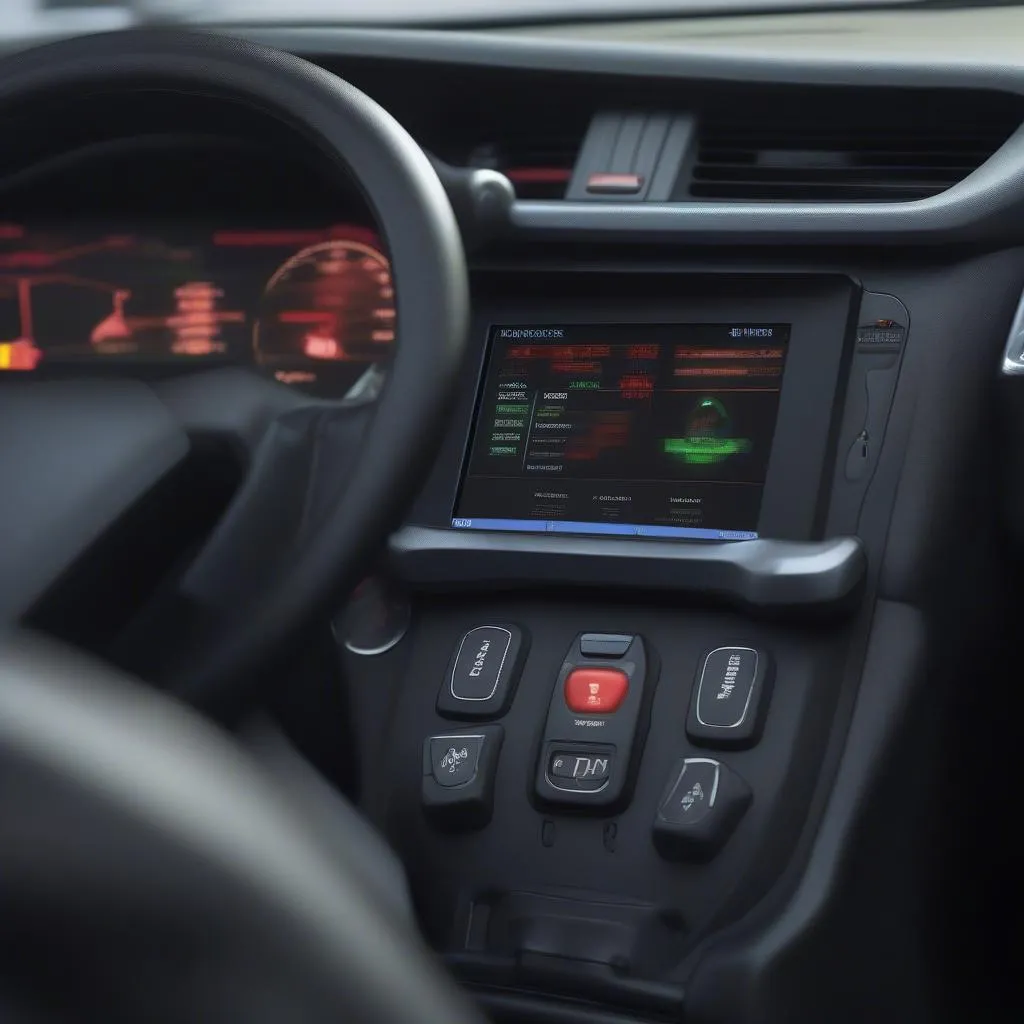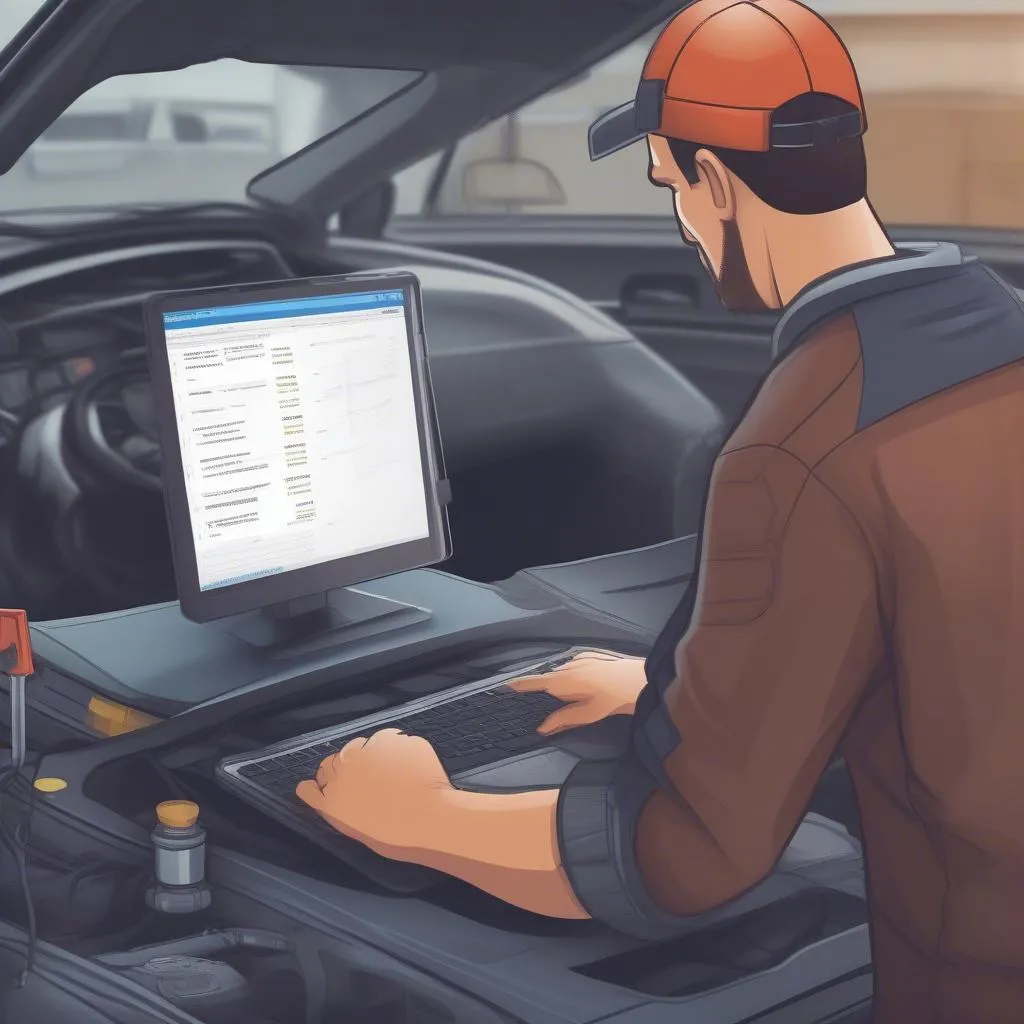Imagine this: you’re cruising down Highway 1 in your Ford Mustang, the California sun warming your face, when suddenly, the “Check Engine” light pops up. Your heart sinks. What’s wrong? Is it something serious? Before you panic and rush to a mechanic, let’s talk about a little device that can save you time, money, and a whole lot of worry – the OBD scanner.
What’s the Big Deal with OBD Scanners?
OBD stands for On-Board Diagnostics, and these handy scanners are like mini-computers that plug into your car’s OBD-II port (usually found under the dashboard). But what makes them so special? Let’s break it down:
For Car Owners:
- Decode the “Check Engine” Light: No more guessing games! An OBD scanner tells you exactly what’s triggering that dreaded light, often with detailed code definitions.
- Become Your Own Mechanic (Sort of): Depending on the scanner, you can diagnose issues, monitor engine performance, and even reset minor issues yourself.
- Save Money on Repairs: By knowing the exact problem beforehand, you can avoid unnecessary trips to the mechanic and potentially inflated repair costs.
- Increased Peace of Mind: Regularly scanning your car can help you catch small problems before they turn into major (and expensive) headaches.
For Mechanics and Professionals:
- Fast and Accurate Diagnostics: OBD scanners provide instant access to a wealth of data, making diagnosing problems quick and efficient.
- Enhanced Troubleshooting: View live data streams, graph sensor readings, and perform advanced diagnostics for complex repairs.
- Improved Customer Service: Provide transparent and detailed explanations of car problems to customers, building trust and confidence.
OBD Scanner Benefits: Delving Deeper
1. What Does an OBD Scanner Actually Do?
Think of your car’s computer system like a network, constantly sending and receiving information from various sensors. An OBD scanner taps into this network, acting as a translator for all that technical jargon. It retrieves diagnostic trouble codes (DTCs), which are basically error codes that pinpoint malfunctions within different systems.
2. What Can I Learn from an OBD Scanner?
The information you get depends on the type of scanner (more on that later), but here’s a glimpse:
- Engine Performance Data: RPM, speed, coolant temperature, air intake temperature, and more.
- Emissions Data: Oxygen sensor readings, evaporative emissions system status, and other emissions-related information.
- Transmission Data: Gear ratios, fluid temperature, and potential transmission issues.
- Safety System Status: Airbag deployment data, ABS system status, etc.
Expert Insight: “The advent of OBD scanners has revolutionized the automotive industry,” says Robert Larson, author of “The Complete Guide to Automotive Diagnostics.” “These tools empower both professionals and car enthusiasts to understand their vehicles on a deeper level.”
3. What Types of OBD Scanners Are Available?
- Basic Code Readers: These affordable scanners retrieve and define DTCs, perfect for DIYers who want to understand the “Check Engine” light.
- Bluetooth Scanners: Connect wirelessly to your smartphone or tablet, providing a user-friendly interface and often access to more advanced features.
- Professional-Grade Scanners: Used by mechanics and workshops, these offer comprehensive diagnostics, live data streaming, and advanced programming capabilities.
Tech Car USA Tip: Check out our detailed reviews on the latest OBD scanners to find the perfect fit for your needs: [link to a relevant OBD scanner review article].
4. Can an OBD Scanner Fix My Car?
While an OBD scanner can help you identify problems, it’s not a magic wand! It won’t physically repair your car. However, by knowing the root cause of the issue, you can make informed decisions about repairs, saving time and money.
Scenario: Imagine your BMW 5 Series suddenly stalls in the middle of traffic on Michigan Avenue, Chicago. An OBD scan reveals a faulty crankshaft position sensor. Armed with this knowledge, you can confidently call a tow truck and inform the mechanic about the specific issue, avoiding unnecessary diagnostic fees.
 OBD scanner plugged into car
OBD scanner plugged into car
5. Are There Any Risks in Using an OBD Scanner?
OBD scanners are generally safe to use, even for beginners. However, it’s crucial to use a reputable scanner and avoid tampering with settings or components you’re unfamiliar with. Incorrectly modifying settings could potentially affect your car’s performance.
Frequently Asked Questions About OBD Scanners
Q: Can I use any OBD scanner on my car?
A: Most cars manufactured after 1996 in the US are equipped with the OBD-II standard, so most scanners will work. However, certain European car brands, especially older models, might require specialized scanners.
Q: How often should I scan my car?
A: It’s a good practice to scan your car at least once a year or whenever your “Check Engine” light comes on.
Q: Can an OBD scanner detect problems with my car’s battery?
A: While some scanners offer limited battery-related information, they might not provide a comprehensive diagnosis. A dedicated battery tester is more suitable for that purpose.
Unlock Your Car’s Potential with an OBD Scanner
Just like your smartphone keeps you connected to the digital world, an OBD scanner bridges the gap between you and your car’s inner workings. Whether you’re a DIY enthusiast or a seasoned mechanic, the benefits of owning an OBD scanner are undeniable.
Need help choosing the right OBD scanner or navigating the world of automotive diagnostics? Our team at Tech Car USA is here to help! Contact us on Whatsapp at +84767531508 for expert advice and personalized recommendations.
Don’t forget to check out our other informative articles on automotive technology and repairs on our website!
 Mechanic using OBD scanner
Mechanic using OBD scanner
